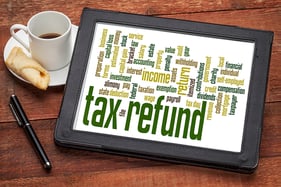
When you receive your tax refund, learning how to spend it wisely is your best bet. But you should also learn some of the ways you shouldn't be using it. Below, we've provided you with ideas on how to use your IRS tax refund and some ways you should avoid.
Create an Emergency Fund
Not having any savings leaves you vulnerable if you were to lose your job, have a significant car or home repair, or have a medical emergency. You'd be forced to look towards short-term loans that have higher interest rates or relying on your credit cards and racking up your balances. It's a much smarter idea to start an emergency fund, so you know you have money put aside in case you need it.
Aim to save between three to six months of living expenses in your emergency fund. To help you avoid spending this money frivolously, it’s a good idea to put it into a separate savings account.
Pay Down Debt
Along with saving for emergencies, you should also pay down debt. Begin by reviewing the interest rates on your current loan balances. Find the debts with the highest interest rates and start there. Every month you keep high-interest loans active is another month you’re losing money by paying interest.
Pay Off High-Interest Credit Cards
If you have credit card balances, you should consider using your refund to pay them off to at least significantly lower the balance or with a balance transfer to a lower interest rate card. Credit cards are some of the most expensive loans – especially cards offered by big banks and credit card companies.
It doesn’t make a lot of financial sense to add your $3,000 tax refund into an account that yields 1% interest yet continue to maintain a $3,000 balance on a credit card with an 18% interest rate.
Here's what NOT to do with your tax refund:
Don't Have Your Tax Refund Put on a Debit Card
The biggest issue with receiving your refund on a prepaid card is the fees associated with it. Prepaid cards often come with fees to withdraw your money at ATMs or even just use your card. Some companies will even charge you a monthly maintenance fee. These fees can easily and unnecessarily take away from your tax refund.
In addition, it’s more challenging to save money with a debit card. You would have to withdrawal the funds from an ATM, then deposit the cash into your savings account – possibly incurring an ATM fee to do so. Receiving your tax refund on a prepaid card is primarily for individuals who do not have an existing savings or checking account. At Freedom First, we have a variety of checking and savings accounts available to help meet all your needs.
Avoid Spending Your Refund Without a Plan
You should resist the urge to spend your tax refund frivolously, particularly with everything we've learned from the pandemic. You should instead be using some of it as an emergency fund, or if you want to splurge a little on yourself, split it. For instance, you could spend 30% of it as fun money and put 70% towards paying off debt or towards your savings.
It's understandable that you'll immediately start thinking about the different things you can buy with a tax refund coming in. But, before you start spending the money, perhaps take a little time and plan out what you could do with it. Consider adding to your savings or retirement fund or paying for any necessary expenses like:
- Home repairs
- Car repairs
- Medical bills
Forget the Refund Anticipation Loan
Refund anticipation loans, at first glance, might seem like a good idea. You already know you have a return coming to you; why not receive it early and then pay it back once you receive your refund?
But the biggest issue with refund anticipation loans is you typically need to use a tax preparation agency to file your taxes. These companies usually charge fees that can start around $48. They might also tack on fees to apply for the loan and fees for having the funds disbursed. So, basically, you'll be using a portion of your tax refund simply to get it a little quicker.
We’re Here to Help!
With a little discipline and planning, your tax refund could significantly impact your finances in a positive way. Whether it’s paying off debt, boosting your savings, or a combination of both, tax time is the perfect opportunity to get your finances back on track.
If you’re interested in setting up a checking or savings account for your emergency fund or would like to work on paying down debt, we’re ready to help. Please stop by any of our convenient branch locations or give us a call at toll free 866-389-0244.





